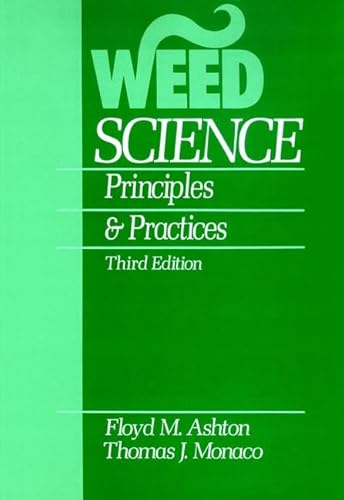The updated edition of the classic, fundamental book on weed scienceWeed Science provides a detailed examination of the principles of integrated weed management with important details on how chemical herbicides work and should be used. This revised Fourth Edition addresses recent developments affecting weed science. These include the increased use of conservation-tillage systems, environmental concerns about the runoff of agrochemicals, soil conservation, crop biotechnology, resistance of weeds and crops to herbicides, weed control in nonagricultural settings and concerns regarding invasive plants, wetland restoration, and the need for a vastly improved understanding of weed ecology.
Current management practices are covered along with guidance for selecting herbicides and using them effectively. To serve as a more efficient reference, herbicides are cross-listed by chemical and brand name and grouped by mechanism of action and physiological effect rather than chemical structure. In addition, an introduction to organic chemistry has been added to familiarize readers with organic herbicides. Also included are guidelines on weed-control practices for specific crops or situations, such as small grains, row crops, horticultural crops, lawns and turf, range land, brush, and aquatic plant life.
Generously supplemented with 300 drawings, photographs, and tables, Weed Science is an essential book for students taking an introductory course in weed science, as well as a reference for agricultural advisors, county agents, extension specialists, and professionals throughout the agrochemical industry.
About the authors FLOYD M. ASHTON taught in the Department of Botany, University of California, Davis, for over thirty years until his retirement in 1988. An influential figure in weed science, Dr. Ashton has authored or coauthored numerous scientific papers, reviews, book chapters, and articles on weed science and plant physiology and Mode of Action of Herbicides, Second Edition (Wiley, 1981). A recipient of many honors, Dr. Ashton has received a National Institute of Health Senior Fellowship and served as the USA Delegate to the First United Nations Conference on Weed Control and the USA Delegate to the National Science Foundation INDO-US Conference on Biodegradable Pesticides. He also received the Outstanding Research Award from the Weed Science Society of America and is also an elected Fellow of the Society, Dr. Ashton received his BS from the University of Illinois and a PhD from Ohio State University. THOMAS J. MONACO is a professor and head of the Department of Horticultural Science at North Carolina State University. Dr. Monaco served as president of the Weed Science Society of North Carolina, on the executive board of the Weed Science Society of America, and as associate editor of the Weed Science Journal. The recipient of numerous honors and awards, Dr. Monaco received the Outstanding Contributions to Agriculture Award from Ciba-Geigy (1983) and Outstanding Graduate Educator Award from the American Society for Horticultural Science (1986). Dr. Monaco received a BS in horticulture and an MS in agronomy/weed science from Rutgers University and a PhD in crop science/weed science from North Carolina State University.
![]()
